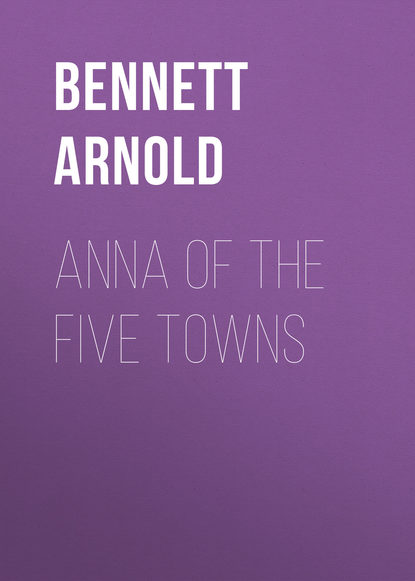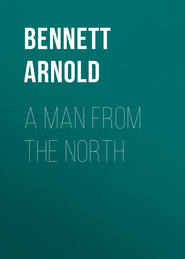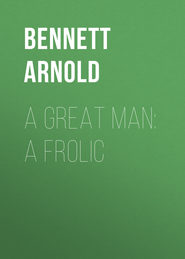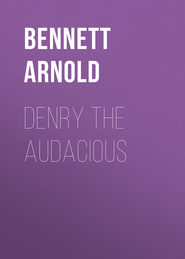По всем вопросам обращайтесь на: info@litportal.ru
(©) 2003-2024.
✖
Anna of the Five Towns
Настройки чтения
Размер шрифта
Высота строк
Поля
By a common instinct, Mynors and Anna made little Agnes the centre of attraction. Mynors continued to tease her, and Agnes growing courageous, began to retort. She was now walking between them, and the other two smiled to each other at the child's sayings over her head, interchanging thus messages too subtle and delicate for the coarse medium of words.
As they approached the Park the bandstand came into sight over the railway cutting, and they could hear the music of 'The Emperor's Hymn.' The crude, brazen sounds were tempered in their passage through the warm, still air, and fell gently on the ear in soft waves, quickening every heart to unaccustomed emotions. Children leaped forward, and old people unconsciously assumed a lightsome vigour.
The Park rose in terraces from the railway station to a street of small villas almost on the ridge of the hill. From its gilded gates to its smallest geranium-slips it was brand-new, and most of it was red. The keeper's house, the bandstand, the kiosks, the balustrades, the shelters – all these assailed the eye with a uniform redness of brick and tile which nullified the pallid greens of the turf and the frail trees. The immense crowd, in order to circulate, moved along in tight processions, inspecting one after another the various features of which they had read full descriptions in the 'Staffordshire Signal' – waterfall, grotto, lake, swans, boat, seats, faïence, statues – and scanning with interest the names of the donors so clearly inscribed on such objects of art and craft as from divers motives had been presented to the town by its citizens. Mynors, as he manoeuvred a way for the two girls through the main avenue up to the topmost terrace, gravely judged each thing upon its merits, approving this, condemning that. In deciding that under all the circumstances the Park made a very creditable appearance he only reflected the best local opinion. The town was proud of its achievement, and it had the right to be; for, though this narrow pleasaunce was in itself unlovely, it symbolised the first faint renascence of the longing for beauty in a district long given up to unredeemed ugliness.
At length, Mynors having encountered many acquaintances, they got past the bandstand and stood on the highest terrace, which was almost deserted. Beneath them, in front, stretched a maze of roofs, dominated by the gold angel of the Town Hall spire. Bursley, the ancient home of the potter, has an antiquity of a thousand years. It lies towards the north end of an extensive valley, which must have been one of the fairest spots in Alfred's England, but which is now defaced by the activities of a quarter of a million of people. Five contiguous towns – Turnhill, Bursley, Hanbridge, Knype, and Longshaw – united by a single winding thoroughfare some eight miles in length, have inundated the valley like a succession of great lakes. Of these five Bursley is the mother, but Hanbridge is the largest. They are mean and forbidding of aspect – sombre, hard-featured, uncouth; and the vaporous poison of their ovens and chimneys has soiled and shrivelled the surrounding country till there is no village lane within a league but what offers a gaunt and ludicrous travesty of rural charms. Nothing could be more prosaic than the huddled, red-brown streets; nothing more seemingly remote from romance. Yet be it said that romance is even here – the romance which, for those who have an eye to perceive it, ever dwells amid the seats of industrial manufacture, softening the coarseness, transfiguring the squalor, of these mighty alchemic operations. Look down into the valley from this terrace-height where love is kindling, embrace the whole smoke-girt amphitheatre in a glance, and it may be that you will suddenly comprehend the secret and superb significance of the vast Doing which goes forward below. Because they seldom think, the townsmen take shame when indicted for having disfigured half a county in order to live. They have not understood that this disfigurement is merely an episode in the unending warfare of man and nature, and calls for no contrition. Here, indeed, is nature repaid for some of her notorious cruelties. She imperiously bids man sustain and reproduce himself, and this is one of the places where in the very act of obedience he wounds and maltreats her. Out beyond the municipal confines, where the subsidiary industries of coal and iron prosper amid a wreck of verdure, the struggle is grim, appalling, heroic – so ruthless is his havoc of her, so indomitable her ceaseless recuperation. On the one side is a wresting from nature's own bowels of the means to waste her; on the other, an undismayed, enduring fortitude. The grass grows; though it is not green, it grows. In the very heart of the valley, hedged about with furnaces, a farm still stands, and at harvest-time the sooty sheaves are gathered in.
The band stopped playing. A whole population was idle in the Park, and it seemed, in the fierce calm of the sunlight, that of all the strenuous weekday vitality of the district only a murmurous hush remained. But everywhere on the horizon, and nearer, furnaces cast their heavy smoke across the borders of the sky: the Doing was never suspended.
'Mr. Mynors,' said Agnes, still holding his hand, when they had been silent a moment, 'when do those furnaces go out?'
'They don't go out,' he answered, 'unless there is a strike. It costs hundreds and hundreds of pounds to light them again.'
'Does it?' she said vaguely. 'Father says it's the smoke that stops my gilliflowers from growing.'
Mynors turned to Anna. 'Your father seems the picture of health. I saw him out this morning at a quarter to seven, as brisk as a boy. What a constitution!'
'Yes,' Anna replied, 'he is always up at six.'
'But you aren't, I suppose?'
'Yes, I too.'
'And me too,' Agnes interjected.
'And how does Bursley compare with Hanbridge?' Mynors continued. Anna paused before replying.
'I like it better,' she said. 'At first – last year – I thought I shouldn't.'
'By the way, your father used to preach in Hanbridge circuit – '
'That was years ago,' she said quickly.
'But why won't he preach here? I dare say you know that we are rather short of local preachers – good ones, that is.'
'I can't say why father doesn't preach now:' Anna flushed as she spoke. 'You had better ask him that.'
'Well, I will do,' he laughed. 'I am coming to see him soon – perhaps one night next week.'
Anna looked at Henry Mynors as he uttered the astonishing words. The Tellwrights had been in Bursley a year, but no visitor had crossed their doorsteps except the minister, once, and such poor defaulters as came, full of excuse and obsequious conciliation, to pay rent overdue.
'Business, I suppose?' she said, and prayed that he might not be intending to make a mere call of ceremony.
'Yes, business,' he answered lightly. 'But you will be in?'
'I am always in,' she said. She wondered what the business could be, and felt relieved to know that his visit would have at least some assigned pretext; but already her heart beat with apprehensive perturbation at the thought of his presence in their household.
'See!' said Agnes, whose eyes were everywhere, 'There's Miss Sutton.'
Both Mynors and Anna looked sharply round. Beatrice Sutton was coming towards them along the terrace. Stylishly clad in a dress of pink muslin, with harmonious hat, gloves, and sunshade, she made an agreeable and rather effective picture, despite her plain, round face and stoutish figure. She had the air of being a leader. Grafted on to the original simple honesty of her eyes there was the unconsciously-acquired arrogance of one who had always been accustomed to deference. Socially, Beatrice had no peer among the young women who were active in the Wesleyan Sunday-school. Beatrice had been used to teach in the afternoon school, but she had recently advanced her labours from the afternoon to the morning in response to a hint that if she did so the force of her influence and example might lessen the chronic dearth of morning teachers.
'Good afternoon, Miss Tellwright,' Beatrice said as she came up. 'So you have come to look at the Park.'
'Yes,' said Anna, and then stopped awkwardly. In the tone of each there was an obscure constraint, and something in Mynors' smile of salute to Beatrice showed that he too shared it.
'Seen you before,' Beatrice said to him familiarly, without taking his hand; then she bent down and kissed Agnes.
'What are you doing here, mademoiselle?' Mynors asked her.
'Father's just down below, near the lake. He caught sight of you, and sent me up to say that you were to be sure to come in to supper to-night. You will, won't you?'
'Yes, thanks. I had meant to.'
Anna knew that they were related, and also that Mynors was constantly at the Suttons' house, but the close intimacy between these two came nevertheless like a shock to her. She could not conquer a certain resentment of it, however absurd such a feeling might seem to her intelligence. And this attitude extended not only to the intimacy, but to Beatrice's handsome clothes and facile urbanity, which by contrast emphasised her own poor little frock and tongue-tied manner. The mere existence of Beatrice so near to Mynors was like an affront to her. Yet at heart, and even while admiring this shining daughter of success, she was conscious within herself of a fundamental superiority. The soul of her condescended to the soul of the other one.
They began to discuss the Park.
'Papa says it will send up the value of that land over there enormously,' said Beatrice, pointing with her ribboned sunshade to some building plots which lay to the north, high up the hill. 'Mr. Tellwright owns most of that, doesn't he?' she added to Anna.
'I dare say he does,' said Anna. It was torture to her to refer to her father's possessions.
'Of course it will be covered with streets in a few months. Will he build himself, or will he sell it?'
'I haven't the least idea,' Anna answered, with an effort after gaiety of tone, and then turned aside to look at the crowd. There, close against the bandstand, stood her father, a short, stout, ruddy, middle-aged man in a shabby brown suit. He recognised her, stared fixedly, and nodded with his grotesque and ambiguous grin. Then he sidled off towards the entrance of the Park. None of the others had seen him. 'Agnes dear,' she said abruptly, 'we must go now, or we shall be late for tea.'
As the two women said good-bye their eyes met, and in the brief second of that encounter each tried to wring from the other the true answer to a question which lay unuttered in her heart. Then, having bidden adieu to Mynors, whose parting glance sang its own song to her, Anna took Agnes by the hand and left him and Beatrice together.
CHAPTER II
THE MISER'S DAUGHTER
Anna sat in the bay-window of the front parlour, her accustomed place on Sunday evenings in summer, and watched Mr. Tellwright and Agnes disappear down the slope of Trafalgar Road on their way to chapel. Trafalgar Road is the long thoroughfare which, under many aliases, runs through the Five Towns from end to end, uniting them as a river might unite them. Ephraim Tellwright could remember the time when this part of it was a country lane, flanked by meadows and market gardens. Now it was a street of houses up to and beyond Bleakridge, where the Tellwrights lived; on the other side of the hill the houses came only in patches until the far-stretching borders of Hanbridge were reached. Within the municipal limits Bleakridge was the pleasantest quarter of Bursley – Hillport, abode of the highest fashion, had its own government and authority – and to reside 'at the top of Trafalgar Road' was still the final ambition of many citizens, though the natural growth of the town had robbed Bleakridge of some of that exclusive distinction which it once possessed. Trafalgar Road, in its journey to Bleakridge from the centre of the town, underwent certain changes of character. First came a succession of manufactories and small shops; then, at the beginning of the rise, a quarter of a mile of superior cottages; and lastly, on the brow, occurred the houses of the comfortable-detached, semi-detached, and in terraces, with rentals from 25l. to 60l. a year. The Tellwrights lived in Manor Terrace (the name being a last reminder of the great farmstead which formerly occupied the western hill side): their house, of light yellow brick, was two-storied, with a long narrow garden behind, and the rent 30l. Exactly opposite was an antique red mansion, standing back in its own ground – home of the Mynors family for two generations, but now a school, the Mynors family being extinct in the district save for one member. Somewhat higher up, still on the opposite side to Manor Terrace, came an imposing row of four new houses, said to be the best planned and best built in the town, each erected separately and occupied by its owner. The nearest of these four was Councillor Sutton's, valued at 60l. a year. Lower down, below Manor Terrace and on the same side, lived the Wesleyan superintendent minister, the vicar of St. Luke's Church, an alderman, and a doctor.
It was nearly six o'clock. The sun shone, but gentlier; and the earth lay cooling in the mild, pensive effulgence of a summer evening. Even the onrush of the steam-car, as it swept with a gay load of passengers to Hanbridge, seemed to be chastened; the bell of the Roman Catholic chapel sounded like the bell of some village church heard in the distance; the quick but sober tramp of the chapel-goers fell peacefully on the ear. The sense of calm increased, and, steeped in this meditative calm, Anna from the open window gazed idly down the perspective of the road, which ended a mile away in the dim concave forms of ovens suffused in a pale mist. A book from the Free Library lay on her lap; she could not read it. She was conscious of nothing save the quiet enchantment of reverie. Her mind, stimulated by the emotions of the afternoon, broke the fetters of habitual self-discipline, and ranged voluptuously free over the whole field of recollection and anticipation. To remember, to hope: that was sufficient joy.
In the dissolving views of her own past, from which the rigour and pain seemed to have mysteriously departed, the chief figure was always her father – that sinister and formidable individuality, whom her mind hated but her heart disobediently loved. Ephraim Tellwright[1 - Tellwright: tile-wright, a name specially characteristic of, and possibly originating in, this clay-manufacturing district.] was one of the most extraordinary and most mysterious men in the Five Towns. The outer facts of his career were known to all, for his riches made him notorious; but of the secret and intimate man none knew anything except Anna, and what little Anna knew had come to her by divination rather than discernment. A native of Hanbridge, he had inherited a small fortune from his father, who was a prominent Wesleyan Methodist. At thirty, owing mainly to investments in property which his calling of potter's valuer had helped him to choose with advantage, he was worth twenty thousand pounds, and he lived in lodgings on a total expenditure of about a hundred a year. When he was thirty-five he suddenly married, without any perceptible public wooing, the daughter of a wood merchant at Oldcastle, and shortly after the marriage his wife inherited from her father a sum of eighteen thousand pounds. The pair lived narrowly in a small house up at Pireford, between Hanbridge and Oldcastle. They visited no one, and were never seen together except on Sundays. She was a rosy-cheeked, very unassuming and simple woman, who smiled easily and talked with difficulty, and for the rest lived apparently a servile life of satisfaction and content. After five years Anna was born, and in another five years Mrs. Tellwright died of erysipelas. The widower engaged a housekeeper: otherwise his existence proceeded without change. No stranger visited the house, the housekeeper never gossiped; but tales will spread, and people fell into the habit of regarding Tellwright's child and his housekeeper with commiseration.
During all this period he was what is termed 'a good Wesleyan,' preaching and teaching, and spending himself in the various activities of Hanbridge chapel. For many years he had been circuit treasurer. Among Anna's earliest memories was a picture of her father arriving late for supper one Sunday night in autumn after an anniversary service, and pouring out on the white tablecloth the contents of numerous chamois-leather money-bags. She recalled the surprising dexterity with which he counted the coins, the peculiar smell of the bags, and her mother's bland exclamation, 'Eh, Ephraim!' Tellwright belonged by birth to the Old Guard of Methodism; there was in his family a tradition of holy valour for the pure doctrine: his father, a Bursley man, had fought in the fight which preceded the famous Primitive Methodist Secession of 1808 at Bursley, and had also borne a notable part in the Warren affrays of '28, and the disastrous trouble of the Fly-Sheets in '49, when Methodism lost a hundred thousand members. As for Ephraim, he expounded the mystery of the Atonement in village conventicles and grew garrulous with God at prayer-meetings in the big Bethesda chapel; but he did these things as routine, without skill and without enthusiasm, because they gave him an unassailable position within the central group of the society. He was not, in fact, much smitten with either the doctrinal or the spiritual side of Methodism. His chief interest lay in those fiscal schemes of organisation without whose aid no religious propaganda can possibly succeed. It was in the finance of salvation that he rose supreme – the interminable alternation of debt-raising and new liability which provides a lasting excitement for Nonconformists. In the negotiation of mortgages, the artful arrangement of appeals, the planning of anniversaries and of mighty revivals, he was an undisputed leader. To him the circuit was a 'going concern,' and he kept it in motion, serving the Lord in committee and over statements of account. The minister by his pleading might bring sinners to the penitent form, but it was Ephraim Tellwright who reduced the cost per head of souls saved, and so widened the frontiers of the Kingdom of Heaven.
Three years after the death of his first wife it was rumoured that he would marry again, and that his choice had fallen on a young orphan girl, thirty years his junior, who 'assisted' at the stationer's shop where he bought his daily newspaper. The rumour was well-founded. Anna, then eight years of age, vividly remembered the home-coming of the pale wife, and her own sturdy attempts to explain, excuse, or assuage to this wistful and fragile creature the implacable harshness of her father's temper. Agnes was born within a year, and the pale girl died of puerperal fever. In that year lay a whole tragedy, which could not have been more poignant in its perfection if the year had been a thousand years. Ephraim promptly re-engaged the old housekeeper, a course which filled Anna with secret childish revolt, for Anna was now nine, and accomplished in all domesticity. In another seven years the housekeeper died, a gaunt grey ruin, and Anna at sixteen became mistress of the household, with a small sister to cherish and control. About this time Anna began to perceive that her father was generally regarded as a man of great wealth, having few rivals in the entire region of the Five Towns, Definite knowledge, however, she had none: he never spoke of his affairs; she knew only that he possessed houses and other property in various places, that he always turned first to the money article in the newspaper, and that long envelopes arrived for him by post almost daily. But she had once heard the surmise that he was worth sixty thousand of his own, apart from the fortune of his first wife, Anna's mother. Nevertheless, it did not occur to her to think of her father, in plain terms, as a miser, until one day she happened to read in the 'Staffordshire Signal' some particulars of the last will and testament of William Wilbraham, J.P., who had just died. Mr. Wilbraham had been a famous magnate and benefactor of the Five Towns; his revered name was in every mouth; he had a fine seat, Hillport House, at Hillport; and his superb horses were constantly seen, winged and nervous, in the streets of Bursley and Hanbridge. The 'Signal' said that the net value of his estate was sworn at fifty-nine thousand pounds. This single fact added a definite and startling significance to figures which had previously conveyed nothing to Anna except an idea of vastness. The crude contrast between the things of Hillport House and the things of the six-roomed abode in Manor Terrace gave food for reflection, silent but profound.
Tellwright had long ago retired from business, and three years after the housekeeper died he retired, practically, from religious work, to the grave detriment of the Hanbridge circuit. In reply to sorrowful questioners, he said merely that he was getting old and needed rest, and that there ought to be plenty of younger men to fill his shoes. He gave up everything except his pew in the chapel. The circuit was astounded by this sudden defection of a class-leader, a local preacher, and an officer. It was an inexplicable fall from grace. Yet the solution of the problem was quite simple. Ephraim had lost interest in his religious avocations; they had ceased to amuse him, the old ardour had cooled. The phenomenon is a common enough experience with men who have passed their fiftieth year – men, too, who began with the true and sacred zeal, which Tellwright never felt. The difference in Tellwright's case was that, characteristically, he at once yielded to the new instinct, caring naught for public opinion. Soon afterwards, having purchased a lot of cottage property in Bursley, he decided to migrate to the town of his fathers. He had more than one reason for doing so, but perhaps the chief was that he found the atmosphere of Hanbridge Wesleyan chapel rather uncongenial. The exodus from it was his silent and malicious retort to a silent rebuke.
He appeared now to grow younger, discarding in some measure a certain morose taciturnity which had hitherto marked his demeanour. He went amiably about in the manner of a veteran determined to enjoy the brief existence of life's winter. His stout, stiff, deliberate yet alert figure became a familiar object to Bursley: that ruddy face, with its small blue eyes, smooth upper lip, and short grey beard under the smooth chin, seemed to pervade the streets, offering everywhere the conundrum of its vague smile. Though no friend ever crossed his doorstep, he had dozens of acquaintances of the footpath. He was not, however, a facile talker, and he seldom gave an opinion; nor were his remarks often noticeably shrewd. He existed within himself, unrevealed. To the crowd, of course, he was a marvellous legend, and moving always in the glory of that legend he received their wondering awe – an awe tinged with contempt for his lack of ostentation and public splendour. Commercial men with whom he had transacted business liked to discuss his abilities, thus disseminating that solid respect for him which had sprung from a personal experience of those abilities, and which not even the shabbiness of his clothes could weaken.
Anna was disturbed by the arrival at the front door of the milk-girl. Alternately with her father, she stayed at home on Sunday evenings, partly to receive the evening milk and partly to guard the house. The Persian cat with one ear preceded her to the door as soon as he heard the clatter of the can. The stout little milk-girl dispensed one pint of milk into Anna's jug, and spilt an eleemosynary supply on the step for the cat. 'He does like it fresh, Miss,' said the milk-girl, smiling at the greedy cat, and then, with a 'Lovely evenin',' departed down the street, one fat red arm stretched horizontally out to balance the weight of the can in the other. Anna leaned idly against the doorpost, waiting while the cat finished, until at length the swaying figure of the milk-girl disappeared in the dip of the road. Suddenly she darted within, shutting the door, and stood on the hall-mat in a startled attitude of dismay. She had caught sight of Henry Mynors in the distance, approaching the house. At that moment the kitchen clock struck seven, and Mynors, according to the rule of a lifetime, should have been in his place in the 'orchestra' (or, as some term it, the 'singing-seat') of the chapel, where he was an admired baritone. Anna dared not conjecture what impulse had led him into this extraordinary, incredible deviation. She dared not conjecture, but despite herself she knew, and the knowledge shocked her sensitive and peremptory conscience. Her heart began to beat rapidly; she was in distress. Aware that her father and sister had left her alone, did he mean to call? It was absolutely impossible, yet she feared it, and blushed, all solitary there in the passage, for shame. Now she heard his sharp, decided footsteps, and through the glazed panels of the door she could see the outline of his form. He stopped; his hand was on the gate, and she ceased to breathe. He pushed the gate open, and then, at the whisper of some blessed angel, he closed it again and continued his way up the street. After a few moments Anna carried the milk into the kitchen, and stood by the dresser, moveless, each muscle braced in the intensity of profound contemplation. Gradually the tears rose to her eyes and fell; they were the tincture of a strange and mystic joy, too poignant to be endured. As it were under compulsion she ran outside, and down the garden path to the low wall which looked over the grey fields of the valley up to Hillport. Exactly opposite, a mile and a half away, on the ridge, was Hillport Church, dark and clear against the orange sky. To the right, and nearer, lay the central masses of the town, tier on tier of richly-coloured ovens and chimneys. Along the field-paths couples moved slowly. All was quiescent, languorous, beautiful in the glow of the sun's stately declension. Anna put her arms on the wall. Far more impressively than in the afternoon she realised that this was the end of one epoch in her career and the beginning of another. Enthralled by austere traditions and that stern conscience of hers, she had never permitted herself to dream of the possibility of an escape from the parental servitude. She had never looked beyond the horizons of her present world, but had sought spiritual satisfaction in the ideas of duty and sacrifice. The worst tyrannies of her father never dulled the sense of her duty to him; and, without perhaps being aware of it, she had rather despised love and the dalliance of the sexes. In her attitude towards such things there had been not only a little contempt but also some disapproval, as though man were destined for higher ends. Now she saw, in a quick revelation, that it was the lovers, and not she, who had the right to scorn. She saw how miserably narrow, tepid, and trickling the stream of her life had been, and had threatened to be. Now it gushed forth warm, impetuous, and full, opening out new and delicious vistas. She lived; and she was finding the sight to see, the courage to enjoy. Now, as she leaned over the wall, she would not have cared if Henry Mynors indeed had called that night. She perceived something splendid and free in his abandonment of habit and discretion at the bidding of a desire. To be the magnet which could draw that pattern and exemplar of seemliness from the strict orbit of virtuous custom! It was she, the miser's shabby daughter, who had caused this amazing phenomenon. The thought intoxicated her. Without the support of the wall she might have fallen. In a sort of trance she murmured these words: 'He loves me.'
This was Anna Tellwright, the ascetic, the prosaic, the impassive.











